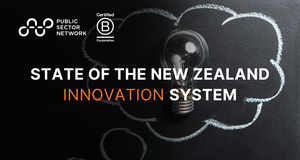
Squiz
and the
Public Sector Network
recently collaborated to deliver the
Q1
ANZ
Digital Government and CX National Insights
on 1st February 2022, Online.
After the event, we were grateful to have had the opportunity to interview
John-Paul Syriatowicz, Co-Founder and Chai
r from Squiz
in an intimate conversation on his perspectives with technology trends and barriers faced in their community.
What overall trends are you seeing in terms of technology in your industry?
The number one trend we’re seeing across all the markets and industries we work in is the growing appreciation and demand for a great digital experience. This really picked up pace during COVID-19, when customer expectations accelerated at a rate that no one could have anticipated, let alone prepared for. It was already an emerging trend prior to the pandemic, but the need to move our lives online caused even historically conservative organisations to assess the experience they were offering customers and audiences online.
We’re also noticing the increase in organisations’ adopting applications from a variety of vendors with a lessening reliance on single big-name providers. Today, organisations want and expect to be able to use the systems and tools that work for them, and they want them to connect and create one seamless workflow.
Finally, we are seeing a big move to software-as-a-service (SaaS) solutions, which are becoming more promising for cost efficiency and mission prioritisation. SaaS improves responsiveness, flexibility and ensures security is maintained, which was particularly important when COVID-19 created new challenges and needs.
What is the next big thing in terms of technology and where do you see it in the next 2 to 5 years?
The next big thing is solving the challenge of building amazing digital experiences without compromising on tech or having to settle for trade-offs, whether that’s for your teams or your users and citizens.
Organisations are now operating within the context of an ever-changing and growing ecosystem of marketing technology, with new tools and innovations constantly emerging to improve different parts of the digital experience.
But, when introducing multiple tools, you have to take into consideration different business units and stakeholders with varying perspectives on the introduction of tech - you have tech teams with security requirements to reach; non-tech teams with experience expectations to meet; and governance measures that organisations generally need to adhere to. These will not always be in harmony, which can cause tension internally and a confusing, inconsistent experience externally.
My view is that the digital experience is going to evolve and make it easier to help people leverage that proliferation of digital technology, without having to make those trade-offs.
Aside from the pandemic , what have been some of the technology challenges or barriers experienced in the last 12 months?
If I look at the sector, our customers and our competitors, the way we all operate, and the challenges we’re facing, there's a lot happening. But, most critically, there's a pace of change. Everyone is in the process of transforming their business, in the face of global competition and digital transformation. There’s a need to differentiate and stay relevant, but it's the pace of change that organisations are struggling to deal with.
At the same time, while everyone is trying to consistently deliver meaningful online customer experiences, they’re all competing for the same, limited resources and are challenged to do more with less.
This skills shortage is having the biggest impact on organisations at the moment. The nature of transformation work is hard and staff are trying to do so many things concurrently. So managers are constantly asking, “Do I have enough people, do they have the necessary skills, and is there any technology that would make their lives easier?”
What has been your best performing technology in the last 12 months and why?
The skills shortage and highly competitive environment to retain staff has seen the request for Squiz’s low-code tools increase, across the board.
To deliver a seamless digital experience to their customers, organisations are turning to digital technologies that don’t require extensive technical expertise.
For example, Squiz Funnelback, our search product, indexes content from many different sources and sites, to deliver information via a simple discovery interface. And Squiz Matrix, our content management system (CMS), offers out-of-the-box templates, which are low-code and low-risk for organisations on tight budgets and tackling staff shortages.
Both of these products are part of the Squiz Digital Experience Platform (DXP). Our full DXP suite of products is built, owned and managed by Squiz, which also removes the need for inhouse technical expertise.





















